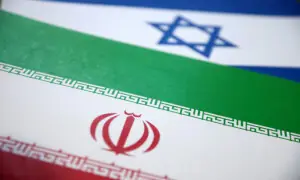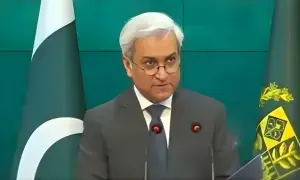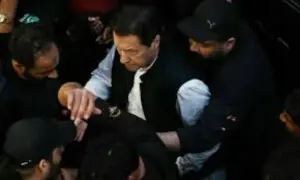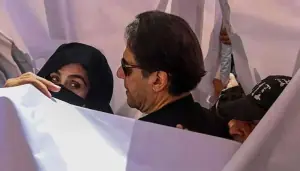Israeli PM: new govt wants peace with Palestinians
 Israeli Prime Minister Benjamin Netanyahusays his new coalition government will promote a "responsible" peace process with the Palestinians.
Israeli Prime Minister Benjamin Netanyahusays his new coalition government will promote a "responsible" peace process with the Palestinians.
Netanyahu spoke Tuesday at a news conference with his new coalition partner, Kadima Party chief Shaul Mofaz.
Netanyahu now presides over a broad coalition with 94 members of the 120-seat parliament.
Netanyahu says he wants the new government to bring about stability in Israeli politics, approve a responsible government budget and "responsibly" conduct peace talks with the Palestinians.
The outgoing coalition, dominated by hard-liners, was accused of not seriously pursuing peace.
THIS IS A BREAKING NEWS UPDATE. Check back soon for further information. AP's earlier story is below.
JERUSALEM (AP) — In a stunning reversal, Prime Minister Benjamin Netanyahu called off early elections Tuesday after reaching an agreement to bring Israel's main opposition party into the government, a move that puts a more moderate face on his hawkish coalition.
The deal to include the centrist Kadima Party was announced just a day after Netanyahu set early elections in motion. Now, With Netanyahu set to lead an overwhelming majority in parliament, it could have implications for a possible Israeli strike on Iran's nuclear facilities and could help Netanyahu fend off challenges over an array of issues from partners in his current coalition.
Netanyahu's office declined comment ahead of a planned afternoon news conference with Kadima leader Shaul Mofaz.
But President Shimon Peres' office confirmed media reports that Netanyahu had struck an agreement with Kadima, parliament's largest party.
"A national unity government is good for the people of Israel ... in light of the crucial challenges facing it, requires broad national unity," Peres' office said.
Netanyahu's coalition, which had been remarkably stable since taking office in March 2009, has been riven by divisions in recent weeks over court orders to demolish two West Bank settlement outposts and to end draft exemptions for tens of thousands of ultra-Orthodox Jewish men.
Israeli media said Netanyahu's agreement with Mofaz included a pledge to end the draft exemptions and to make a serious push for peace with the Palestinians.
Mofaz and Netanyahu still have key differences. Mofaz has accused Netanyahu of not seeking a peace deal with the Palestinians forcefully enough. He also has been a vocal critic of any unilateral Israeli military attack on Iran's nuclear sites.
With Kadima in the government, Netanyahu could have broader backing to make concessions to the Palestinians. While Mofaz could step up pressure to show restraint on Iran, he also has a history of flip flopping. And given his security credentials, Mofaz would give Netanyahu an important stamp of support in a decision to strike Iran.
Amit Segal, chief political reporter for Channel 2 TV, said Mofaz would now be part of Netanyahu's strategic inner Cabinet. He said "many people will raise the question" of whether Netanyahu, Mofaz and Barak have agreed on something "more dramatic" than mundane domestic issues.
Israel, like the West, thinks Iran is developing nuclear weapons, a charge Tehran denies. Israel repeatedly has hinted it might strike Iran if it concludes U.S.-led diplomacy and sanctions have failed.
Israel considers Iran a threat to its survival because of its nuclear and missile development programs, frequent references to Israel's destruction by Iranian leaders, and Tehran's support of violent anti-Israeli groups in Lebanon and Gaza.
Netanyahu's current governing coalition has been dominated by religious and nationalist partners that failed to seriously engage the Palestinians. The coalition also has been criticized for promoting a series of bills that appeared to stifle dissent by targeting dovish groups critical of government policy.
The new government "will try to reach a formula acceptable to all," said Yakov Betzalel, a spokesman for the ultra-Orthodox Shas Party, which opposes a blanket draft.
In recent days, Netanyahu said he hoped to form a stable, broad, centrist coalition in the 120-member parliament after new elections.
An Israeli official said that as Netanyahu stepped up his contacts with Kadima, he realized he could achieve this goal without a new vote. The new government would control 94 seats, making it one of the broadest governments in Israeli history. The official spoke on condition of anonymity to discuss the issue before Netanyahu's news conference.
Kadima had resisted joining the government when former Foreign Minister Tzipi Livni was at the party's helm, because she did not think Netanyahu was serious about reaching a peace deal with the Palestinians.
But Livni, the chief peace negotiator under the preceding Kadima-led government, recently lost her bid to remain party leader to Mofaz, a former military chief and defense minister who will become deputy prime minister under the new coalition agreement.
Last week, she quit the party, opening the way for Mofaz to strike a deal.
"Netanyahu really wanted to have this kind of government ever since the elections of 2009," said Avraham Diskin, a Hebrew University political scientist.
While the prime minister approached the negotiation from a position of strength, Mofaz is in a struggle for survival. Kadima's fortunes flagged under Livni's leadership and polls showed no improvement since Mofaz took over. The surveys predicted the party would drop to about a dozen seats in parliament, compared to its current 28.
The new deal gives Mofaz a year and a half to rehabilitate his party, or possibly merge it with Likud. Kadima broke away from Likud in 2005, and many of its members have their political roots in Likud.
Netanyahu had announced Monday that he would seek to move up national elections to Sept. 4, more than a year ahead of schedule.
The reports of his agreement with Kadima emerged after Israel's parliament held debates that began Monday and lasted long into the night over whether to break up. Israelis, expecting a new election campaign, woke up to the shocking news of the deal.
Parliament Speaker Reuven Rivlin, a veteran of Israeli politics, said he had never seen such last-minute political upheaval. "This is good for Israel because it brings stability, he said on Army Radio as he left parliament before sunrise.
Israel's Labor Party called the move "ridiculous" and said it would remain in the opposition. The news also sidelines political newcomer Yair Lapid, a popular former TV anchorman who has been faring well in opinion polls. Lapid must now wait until the next election to enter parliament. AP


















Comments are closed on this story.